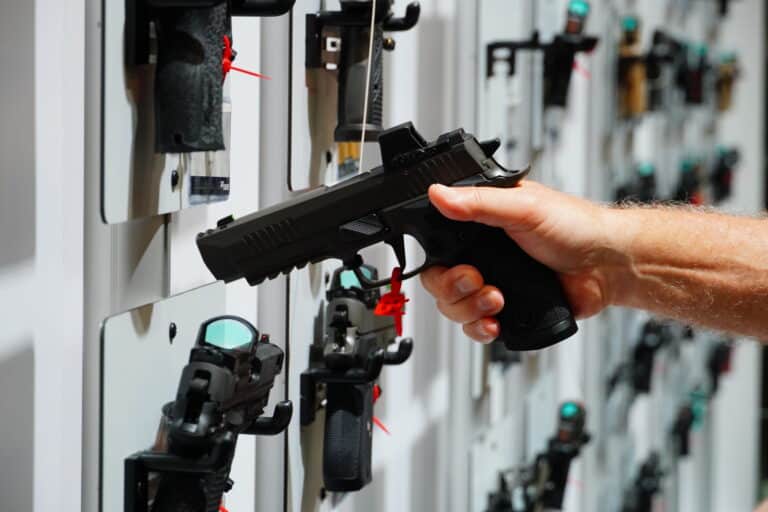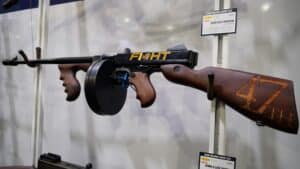Every month of 2024 has seen a decline in gun sales compared to previous years, which suggests Americans aren’t as concerned about the outcome of the presidential election as polling might indicate.
That’s especially true given that 2024’s sales levels have been down not just compared to previous election years, like record-breaking 2020 or even 2022, but also compared to last year. An industry report found sales fell 7.2 percent year over year in May. That came after they dropped 11.2 percent the month before that and 7.4 percent the month before that.
The downturn is bad for the firearms industry. But, given the way gun sales have served as something of a national chaos meter, it may be a good sign for the country as it heads into another tumultuous November.
It’s a bit of a counter-intuitive trend since Americans are telling pollsters they believe the election could lead to new political violence. In fact, it’s one of the few things Americans seem to agree on these days. In a poll taken by Reuters/Ipsos just last month, 68 percent of adults said they “were concerned that extremists will resort to violence if they are unhappy with the election outcome.” Only 15 percent said they weren’t concerned.
Usually, concerns over political violence and new gun bans are strong motivators for people to visit their local gun shop. Americans of all shapes and stripes tend to dislike being told what they can’t own and prefer having the option of self-sufficiency when things start to look grim. They also tend to pay closer attention to those two factors when a presidential election rolls around.
Now, to be fair, fear of new restrictions or political chaos aren’t the only things that drive gun sales. Look at 2020. Both factors played a huge role in the record-smashing sales, but it was the incredible uncertainty of the early onset of the COVID pandemic that drove long lines outside firearms stores across the country. The uncontrolled spread of a novel and deadly virus created everything from runs on grocery stores to meat shortages to police short-staffing to prisoner releases–all of which are well outside the fears that trigger gun buying in a typical election year.
General fear and chaos aren’t the only other drivers for gun sales, either. The seasonal swings in sales, with annual declines in the summer and increases in the fall, are driven largely by demand for hunting. Sport shooting as a pastime, the philosophical appeal of joining an armed populace as a bulwark against tyrannical rule, and the general desire for self-protection unconnected from specific current events are also common motivators.
But maybe people should be more worried about where things are headed in November? The rematch between President Joe Biden and Former President Donald Trump is effectively tied, ensuring an outcome that will make large swaths of the country deeply unhappy.
To start with, the most common driver of election year sales spikes is the possibility of new gun restrictions. That’s certainly present in this election, perhaps even regardless of the outcome. It is, of course, much more likely if Biden is re-elected since he has already pushed the limits of executive restrictions on firearms via the ATF’s rulemaking process in his first term. His pistol-brace ban, so-called ghost gun ban, dealer licensing expansions, and export restrictions play the same tune as Trump’s bump stock ban but turned up to 11. Biden’s primary policy promise during the campaign has been to ban popular firearms like the AR-15, in stark contrast to Trump’s promises to remove certain gun restrictions.
The possibility that Biden, or even Trump, could impose new gun restrictions is the sort of thing that has traditionally caused gun owners to stock up on whatever they think could be banned.
Then there’s the potential for violence in November. After all, Trump supporters stormed the Capitol Building in an attempt to undo the last election. He’s vowed to pardon many of the January 6th rioters.
His rhetoric has ramped up as well. He’s repeatedly called his opponents “vermin” and accused certain migrants of “poisoning the blood of our country.” He just told Dr. Phil that “sometimes revenge can be justified.” He’s teased the idea of running for a third term and advocated for the “termination of all rules, regulations, and articles, even those found in the Constitution.”
“We love this guy,” Trump said of Sean Hannity in a December interview. “He says, ‘You’re not going to be a dictator, are you?’ I said: ‘No, no, no, other than day one. We’re closing the border, and we’re drilling, drilling, drilling. After that, I’m not a dictator.'”
These are usually the kinds of comments that startle gun owners. Of course, gun owners also don’t usually pick somebody who can’t legally own a gun to be their primary political proponent without so much as a debate over the decision.
Political violence isn’t a problem limited to the right either. Trump’s election could also spark a violent backlash from the far-left in the vein of the 2020 riots.
As the Reuters poll shows, Americans appear to perceive this potential danger. But they aren’t having the prototypical American reaction: arming up.
So, why is that?
There are a few potential reasons. The first is the country has reached market saturation after the gun-buying bonanza that was 2020. That would also explain why gun sales have, outside a brief period at the end of 2023, continued to slide since then. There may also be a similar effect at play from multiple previous cycles of panic buying AR-15s and other guns commonly targeted by “assault weapons” bans, such as the post-Sandy Hook rush.
Then there’s the question of how closely Americans are even watching this election. The public is not happy to be faced with a 2020 rematch. A Pew survey from April found about half of Americans would replace both Trump and Biden if given the chance. Traffic to news sites and TV ratings are down significantly from 2020. People haven’t been as engaged through the beginning of the campaign season and may not be paying attention to the factors that typically surge gun buying.
Lastly, most Americans may just be making a calculation that everything going on is less of a threat than pundits or politicos are making out. Gun owners may be confident the expanded view of Second Amendment protections articulated by the Supreme Court in 2022’s New York State Rifle and Pistol Association v. Bruen will foil any attempt to ban the sale of popular firearms. They may not take Trump’s rhetoric literally or seriously and expect his election won’t lead to unrest or abuses of authority. He has a well-established history of saying outrageous things, and it’s not always easy to tell which ones he means in jest.
Whatever the reason, Americans might say they’re worried about chaos in this year’s election, but they aren’t arming up like they mean it. Since gun sales have often served as a kind of chaos meter, many that’s a good sign. Perhaps we aren’t as close to the brink as it sometimes seems?







4 Responses
Good analysis, but you missed a big reason – Economics.
+ Personal debt (Credit card) is approaching record levels while interest rates are increased.
+ Mortgage rates are between 2x-3x what they were in the last two elections.
+ Normal weekly purchases – gasoline, food, diapers, etc. – are way up.
+ Insurance- home, car – are WAY up.
Wages are not keeping up with any of these costs. So folks just cannot afford to buy guns – especially new guns, which is what the data (mostly) tracks.
Yea, economic factors could play a role. A lot of economic signs are positive, but prices have certainly risen substantially since the pandemic. So, people may be less inclined to spend on new guns.
Although, they bought guns in droves at the moment the economy was in a brief freefall during the onset of the pandemic. That tells us people are probably pretty far from feeling the same level of insecurity now, which is positive.
It might simply be a matter of demand saturation at this point.
Living in Washington, I basically did all of my panic buying in 2022, first to beat the clock on the magazine ban and, as soon as that went into effect, I predicted that an assault weapon ban would be passed during the next legislative session and got my panic buying on semiautos done before 2022 was over.
This might actually be the first year since getting into gun ownership that I don’t acquire a firearm, although I would like to add a couple of high-end pistols to my collection just because I think they’re neat.
Stephen, I didn’t see another factor: people aren’t buying guns in ways that can be easily measured, because they’ve realized how much effort is being expended to work around the Constitution by enlisting “private” banks / financial institutions to track who’s buying anything firearms related.
Side note: How the heck do we classify as private an industry that literally cannot exist without the government allowing it?